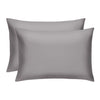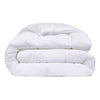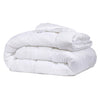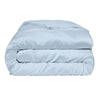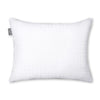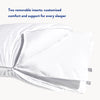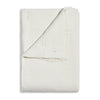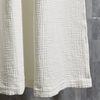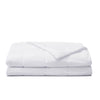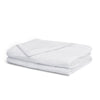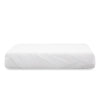The Daily Miracle
How Often Should You Wash Your Sheets: Once Per Week
Published
September 15, 2022
Author
Bridget Reed

We spend a lot of time snuggled up in our beds. While the time we spend in our cozied-up beds is essential (and crucial to our health), so is ensuring your linens are as sanitary as possible. With every shut-eye session comes a whole day's worth of allergens, sweat, grime, and other bacteria (yuck!).
If you're wondering how often you should (really) be washing your dirty sheets, we're here to tell you it's once per week. But don't stop reading here; we have tons of other helpful information regarding what's best for your bedding.
Why Is Bedding Hygiene Important?
Some view laundry day as a hassle, while others view it as a peaceful ritual. We always say that you can find the fun in anything — plus, there's something so rewarding about properly caring for those ultra-luxe sheets you know and love.
Each week the average person spends about 40 to 60 hours in bed. Imagine all the bacteria that builds up during those restful hours.
While sleeping in your own sweat doesn't sound entirely unsanitary for most, here are some other bacteria that may be living in your bed linens:
- Dirt
- Pet dander
- Dead skin cells
- Body oils
- Sweat
- Dust mites, including the critters’ carcasses and fecal matter
- Bed bugs
Dust Mites
Body oils, dead skin cells, and dirt are all pretty nasty, but when they're your own, it doesn't seem that bad (we get it). When it comes to getting a good night’s sleep and staying hygienic, our primary concern is dust mites.
While dust mites won't bite, they can cause serious skin irritation, rashes, discomfort, and even worsened allergies. They're a common pest in most households, and the best way to keep them at bay is by washing your linen sheets frequently.
Getting the right amount of quality sleep is crucial to your health. If you wake up every hour or so sneezing, sniffling, or having trouble breathing, that can seriously affect your sleep quality.
A great way to avoid allergy symptoms is by ensuring your bedding hygiene is up to par — you and your precious new sheets and pillowcases deserve it!
How Often Should You Wash Your Sheets?
Some were taught to wash their sheets once a month, while others twice a week. Well, we're here to clear up any misconceptions — you should wash sheets at least once a week, according to dermatologists.
If you suffer from night sweats, have a habit of napping post-gym (pre-shower), sleep with pets, or struggle with congestion and allergies, a weekly wash may not be enough. If you're using regular sheets (not antibacterial), then your sheets should be more frequent clients to your washroom.
Does washing your sheets two-three times a week seem like overkill? Trust us: If you don't have antibacterial bedding, then it's indispensable.
We understand if you don't have the time (or patience) to implement these suggestions; we have an alternative solution for you — switch over to Antibacterial Bedding. These self-cleaning sheets, pillowcases, and comforters will prevent bacteria build-up, support clearer skin, and will help keep you cool all night long (aka, no more night sweats) and don't need to be washed nearly as often as standard sheets.
How To Wash Bed Sheets
Washing bed sheets is pretty straightforward, but there is a right and wrong way, which usually depends on the fabric. We've formulated an easy-to-follow guide to get the cleanest and softest sheets after every wash.
Read Product Labels Carefully.
Your sheets' fabric will significantly influence how you wash them. Always read labels and care instructions before putting them in the wash.
Use the Hottest Water Possible.
Any good bedding will be made of high-quality cotton, which can usually handle more heat, so stick to hot water when washing your sheets — the hotter the water, the cleaner the sheets. But, if your sheets are polyester or another synthetic material, stick to warm water.
Use a Gentle Detergent.
Even if your detergent is gentle doesn't mean you won't get a good wash. Sometimes the most delicate of detergents give the cleanest result.
Your detergent will have a lot to do with how well your sheets are washed, so this should be a step that isn't taken seriously. Make sure you're using a high-quality, Ultra Concentrated Detergent that works with every type of washer.
Rinse Twice.
Rinsing twice is never wrong, especially if you have sensitive skin. Running your sheets through two wash cycles in your washing machine will ensure you get any excess detergent or bacteria off.
If you have sensitive skin, you should opt for a natural, hypoallergenic detergent with minimal ingredients. Artificial fragrances and harsh chemicals can contribute to breakouts, eczema, and more.
Tumble or Hang Dry.
Beware of your dryer settings. Drying your sheets at a high heat setting can cause damage and shrinkage. You want to keep your sheets as soft as when you first got them; tumble drying or hand drying is a great way to keep the quality of your sheets.
Miracle Tip:
We've all forgotten to switch our laundry over once or twice. Nobody wants to wait up an extra hour for their sheets to dry when all they want to do is get nestled into bed.
To avoid any bedtime delays, we suggest always having two or three sets of clean sheets on hand. This way, when one is washing, you'll have plenty of backups.
If You Can't Get Them Clean Enough
Your sheets have probably seen their fair share of dead skin cells, dirt, bodily fluids, and more. Even if you've sent them through the wash a few times, sometimes they never feel clean enough!
Wanting a new set of sheets is totally okay —- everyone deserves to experience the feeling of sleeping on Extra Luxe Sheets they love.
If you've truly tried your best but can't seem to get your sheets feeling as luxurious as when you first bought them, it may be time to consider a brand-new set.
How Often Should I Wash Other Bedding?
Now that you know everything there is to know about sheet hygiene, what about your other bedding? How often should you wash your pillowcases, blankets, duvet covers, and comforters?
Keep reading:
Pillowcases
Pillowcases are easy as they fall into the same category as sheets —- whenever you wash your sheets, you should wash your pillowcases too.
Blankets
Blankets are tricky as it's dependent on how often you use them. If you seldom spend time snuggling up with your favorite fleece blanket, they won't require as frequent washing as your actual bedding. A good rule of thumb is at least every two weeks, just to be safe.
Comforters and Duvets
As for your comforters and duvets, they don't need to be washed as often as your sheets, but that's not to say they should get forgotten on every wash day.
We suggest washing your comforter at least once a month, but twice would be optimal. Since you aren't laying directly on your comforter every night, they don't need to be washed nearly as much as your sheets, but they still collect bacteria regardless.
Clean As a Whistle
Your sheets are as clean as can be; all that's left to do is kick your feet up and enjoy all your hard work. Sleep easy, knowing that your bedding is clean and ready for tomorrow morning’s fresh start.


